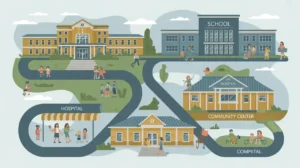Importance of Faith Community Services
Faith community services play a vital role in social support, moral guidance, and community cohesion. In international development, faith-based initiatives often provide education, healthcare, and humanitarian relief in contexts where government services are limited or absent. For nonprofits and social innovators, faith communities are key partners because of their trusted presence, wide reach, and ability to mobilize resources and volunteers. Their importance lies in combining spiritual care with practical support that meets both immediate and long-term needs.
Definition and Features
Faith community services refer to programs and activities organized by religious institutions or faith-based groups to serve their congregations and wider communities. Their defining features include:
- Holistic Care: addressing spiritual, emotional, and physical wellbeing.
- Community Presence: operating through places of worship and local networks.
- Moral and Ethical Frameworks: guiding service delivery with faith-based values.
- Volunteerism: mobilizing congregants to support social outreach and charitable work.
How this Works in Practice
In practice, faith community services range from running schools and clinics to offering food assistance, counseling, or disaster relief. For example, churches, mosques, and temples often host community kitchens, support orphan care, or provide shelter during crises. Faith leaders may also play important roles in peacebuilding and reconciliation in conflict-affected areas. Challenges include balancing inclusivity with religious identity, managing donor expectations, and navigating sensitivities around proselytization.
Implications for Social Innovation
Faith community services have significant implications for social innovation because they blend cultural legitimacy with practical service delivery. They can strengthen trust, expand access in underserved areas, and introduce values-driven approaches to development. For proximate actors, engaging faith communities provides platforms to mobilize local participation and shape services in ways that align with community beliefs and traditions. Faith community services are an important part of the social fabric that supports resilience, cohesion, and human development.







